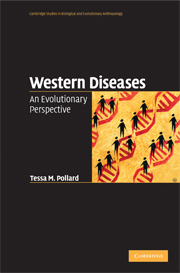Book contents
- Frontmatter
- Contents
- Preface
- 1 Introduction
- 2 An evolutionary history of human disease
- 3 Obesity, type 2 diabetes and cardiovascular disease
- 4 The thrifty genotype versus thrifty phenotype debate: efforts to explain between population variation in rates of type 2 diabetes and cardiovascular disease
- 5 Reproductive cancers
- 6 Reproductive function, breastfeeding and the menopause
- 7 Asthma and allergic disease
- 8 Depression and stress
- 9 Conclusion
- References
- Index
6 - Reproductive function, breastfeeding and the menopause
Published online by Cambridge University Press: 05 June 2012
- Frontmatter
- Contents
- Preface
- 1 Introduction
- 2 An evolutionary history of human disease
- 3 Obesity, type 2 diabetes and cardiovascular disease
- 4 The thrifty genotype versus thrifty phenotype debate: efforts to explain between population variation in rates of type 2 diabetes and cardiovascular disease
- 5 Reproductive cancers
- 6 Reproductive function, breastfeeding and the menopause
- 7 Asthma and allergic disease
- 8 Depression and stress
- 9 Conclusion
- References
- Index
Summary
In this chapter I focus on three aspects of female reproductive life that have been adversely affected by affluent western life: the relatively unrecognised problem of a high rate of impaired reproductive function and infertility in women; the consequences of a lack of breastfeeding for mothers and children; and the menopause. The focus on women is not exclusive and I also discuss briefly how men's reproductive function has been affected by life in the affluent west and consider the debate about whether an analogy can be drawn between menopause in women and the less extreme age-related decline in reproductive function experienced by men.
Impaired reproductive function
My main purpose here is to examine the effects of the high levels of obesity, insulin resistance and insulin seen in western populations (see Chapter 3) on reproductive function. I also consider some other features of the western lifestyle that may affect reproductive function.
Obesity, hyperinsulinaemia and impaired reproductive function
Women living in western societies generally experience higher levels of the ovarian steroid hormones progesterone and oestradiol over a lifetime than do those living in less affluent countries and in the affluent east (see Chapter 5). In fact, ovarian hormone levels in western women are considered to represent the extreme of global variation in ovarian function. As we have seen, this is likely to be a result of mechanisms that evolved to link the availability of energy with fecundity in hunter–gatherer populations.
- Type
- Chapter
- Information
- Western DiseasesAn Evolutionary Perspective, pp. 99 - 119Publisher: Cambridge University PressPrint publication year: 2008



